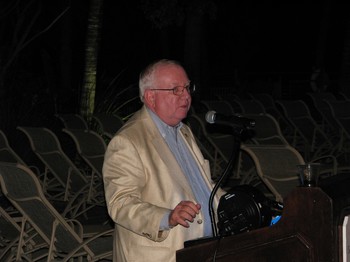Using language far more theological than his predecessors, new Board of Pensions President Frank Spencer urged the Presbyterian Church (U.S.A.)’s pension and healthcare agency to be optimistic, even in the face of volatile health care and stock markets and huge financial pressures in the church.
“We can’t do what we do and not be an optimist if you’re a follower of Jesus Christ,” Spencer urged the board. “We must approach challenges as opportunities – if we do both the Board of Pensions and the PC(USA) will grow and be enlivened. Embody hope, don’t accept decline.”
Spencer, a recent graduate of Union Presbyterian Seminary-Charlotte Campus who took office July 1, said he is challenging the board to pursue ways to enable churches and other employing organizations to extend benefits to their employees not currently covered. The BOP’s current “one-size-fits-all” benefits plan is not sufficient, he said.
“American culture says fairness is when everyone gets the same thing,” Spencer said. “The Bible says fairness is when everyone gets what they need. Right now only 70 percent of clergy and 6-8 percent of our lay employees receive benefits under our current model.”
Spencer said a key directional goal for the BOP going forward is “to maintain the covenant with teaching elders while finding a way to serve more employees who serve the changing church,” adding that the challenge is “ to provide these benefits and pay for them in a way employers can afford.”
To that end, Spencer said the BOP’s Medical Plan will be completely overhauled in 2017. The board’s main areas of focus will continue to be healthcare, death and disability, retirement pension, emergency financial assistance, and education, he said, “but the Board of Pensions as an employer-based healthcare plan should seek to provide ethical benefits that employers want to provide at a cost that is competitive in the marketplace.”
Financial projections for the current Medical Plan model show a net loss of $6-10 million in 2016 and $20-25 million in 2017 “if we don’t change the pricing model,” Spencer said. “Churches are telling us they can’t afford much more. We’re trying to expand the solution set without resorting strictly to dues increases.”
Spencer insisted the Board of Pensions will stay in the health care business. “It’s a great value to the church that the agency providing, offering and administering benefits does so in a way that reflects the church,” he said. “At the end of the day, you want your brothers and sisters making decisions, not a for-profit insurance company – that’s why we’ve got to stay in the healthcare business. It makes a difference that the church is making decisions for its employees.”
But economic viability remains a critical challenge, he admitted. “We must enhance what is already here, to fulfill the church’s covenant with teaching elders,” he said, noting that BOP medical coverage is mandated for installed pastors serving churches. “The Board of Pensions is the most consistent element of ministers’ lives and careers, so we must help employers be the best they can be. That means providing benefits at a cost competitive in the marketplace and providing choice and flexibility in options. Employers are telling us they need flexibility and options.”
The Board’s Healthcare Committee has scheduled at least two special meetings in the coming months to work on the new Medical Plan design, which must be ready for the board’s approval at its March 2016 meeting.
The work ahead is about “the next 300 years,” Spencer said, recalling the agency’s roots in the 1717 founding of the Fund for Pious Uses. “I encourage each of us to be optimists, keeping our eye not only on those who have served the church and those who are serving the church,” he said, “but on those who will serve the church in the future.”
In other actions at its Oct. 22-26 meeting here, the BOP:
- Celebrated the career of Frank Maloney, senior vice –president and Chief Operating Officer, who is concluding his service at the end of the year after a 40-year career with the Board of Pensions.
- Approved a 2015-16 strategic vision and business plan designed “to minimize risk and maximize potential” in the following areas: Medical Plan sustainability, investment market risk, corporate stewardship, and church interface.
- Received a report from its Investment Committee that the 2014 year-to-date performance of the balanced investment portfolio is 4.5 percent, raising the value of the portfolio to $8.6 billion. The 4.5 percent return lagged behind the 4.9 percent return benchmark for the first three-quarters of the year, but the portfolio outperformed the policy benchmark for the five, 10, 15, and 20 years ended Sept. 30.
- Approved or heard final implementation decisions of monthly subscription rate increases for the board’s Medical Continuation (7.5 percent), Medicare Supplement ($6) and Dental plans (6 percent). All increases take effect Jan. 1, 2015.
- Approved a recommendation by the Pension Committee to increase benefit limits, effective Jan. 1, 2015, for the board’s Death and Disability Plan. The action was taken to address inflation and ensure the plan continues to pay an adequate level of benefits.
- Heard from its Healthcare Committee that nearly 50 percent of plan members successfully completed the board’s member health initiative, Call to Health, by the Sept. 30 deadline. In addition to improving their health, Call to Health participants will have lower deductibles for 2015.
- Once again approved Christmas gifts of $250 per individual or $500 per couple from the Assistance Program of the Board of Pensions for recipients of income and housing supplements, maintaining a tradition dating back many years.

